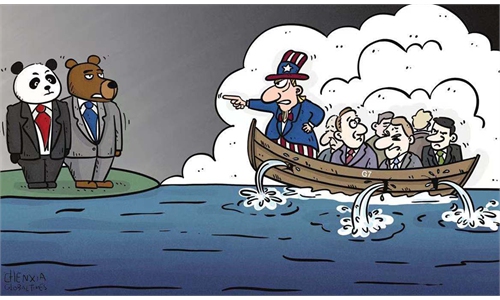OPINION / GLOBAL MINDS
Russia a crucial partner for China in deterring US

The People's Friendship Arch symbolizing Ukraine and Russia's friendship Photo: AFP
What should China do after the outbreak of the Russia-Ukraine conflict? Should China follow the West in condemning and sanctioning Russia as a token of goodwill to improve ties with the US? Some China-based Western journalists may have found some of these claims on the Chinese internet. But such voice is marginal in China, and has absolutely no influence on mainstream society, let alone the decision-making of the Chinese government.
Beijing will adopt a balanced attitude, and resolutely maintain the China-Russia comprehensive strategic partnership of coordination. The same balance has been maintained by China in its refusal to support war.
As an irreplaceable partner, Russia is strategically important to China. This is a consensus that has been formed in mainstream Chinese society. The Chinese people believe that a strong China-Russia relationship is sustainable, and our efforts to promote China-Russian friendship will be effective. But it is very difficult to resolve US hostility toward China, and our efforts in this regard may not necessarily yield the desired results.
The significance of China-Russia relations is reflected in various aspects, with mutual diplomatic support the most obvious. Russia has supported China on affairs relating to the Taiwan island, Hong Kong, Xinjiang and Xizang. But more importantly, China and Russia have formed a strategic pattern of mutual support.
Who is the No.1 strategic adversary viewed by the US today? The answer is China, not Russia. Russia has run up against a challenge and that's why Washington is piling most of the pressure on Moscow. During Donald Trump's presidency, the US wanted to improve ties with Russia. The Chinese people generally believe that over time, the US will point its sword against China again. Many believe that the US may coerce Russia to counter China someday, as Nixon partnered with China to counter the Soviet Union 50 years ago. They are also vigilant against the US' motive to drive a wedge between China and Russia.
Since the Trump administration, China has been under great strategic pressure of the US. The Chinese people had not anticipated that Russia, which was pushed to a strategic corner by NATO's eastward expansion, decided to no longer hold back its temper and completely turn the European geopolitics around. The move unexpectedly took away a large part of US strategic pressure toward China. For quite some time in the future, the confrontation between Russia and the US will be fierce. China has been at the forefront of confrontation against US hegemony since the trade war. But now, Russia stands at the forefront. This is a time for China to accumulate its strength. For the moment, China and Russia are taking turns in bearing the heaviest weight in terms of resisting US hegemony. This is a completely different geopolitical situation than when China was confronting the US alone.
The China-Russia comprehensive strategic partnership of coordination in the new era is special. The ties have no limit, which deters the US. With Russia as a partner, if the US carries out maximum strategic coercion against China, China won't be afraid of the US' energy blockade, and our food supply will be secure. So will other raw materials. It will be harder for the US to make up its mind in engaging in a strategic showdown with China.
If a war breaks out in the Taiwan Straits or in the South China Sea, the US will find it hard to impose nuclear blackmail toward China, as China's conventional forces are getting increasingly stronger to overwhelm those of the US, and no matter Russia supports China or remains neutral at that time, it will be a super nuclear force which is hostile toward the US. China itself is a nuclear power. And the US will have to be wary of Russia leaping from a position of nuclear parity with the US to a position with nuclear advantage.
The strengths of China and Russia are complementary in the strategic field, and their cooperation will bring about endless geopolitical potential. Their strategic ties have certain containing effects toward Japan, as well as traction toward India. Their combined power is capable of keeping Central Asia stable, and away from US influence.
If the US successfully sowed discord between China and Russia, Russia today will immediately face a strategic deadlock. China will also confront the same predicament once a conflict occurs between China and the US. China faces quite a few challenges and uncertainties in its east and south. If Russia was drawn to the US' camp, China would have to fight a two-front confrontation against both the US and Russia and be dragged into a passive status.
Therefore, the idea of ??reconciling ties with the US by abandoning Russia has no market in China at all. Most Chinese people believe that the US' ultimate goal toward Russia is to make it no longer a "nuclear threat," yet its goal toward China is to make China completely lose its development and competitiveness, splitting China into puzzle pieces, with each piece being controlled by the US, purchasing US weapons and producing cheap products.
What is mentioned above can be regarded as the "bottom-line thinking" of Chinese society. In diplomatic practices, China will do its best to avoid conflicts with the US. China-US friendly cooperation, or at least peaceful coexistence, is the common aspirations of the Chinese people. But we are convinced that peaceful coexistence between China and the US is not something that can be earned by pleading. We must constantly boost our own strength to make the US feel that having a conflict with China is more and more unbearable until the US eventually realizes that a peaceful coexistence with China is the best option. Russia is China's most crucial partner to achieve this goal.
The author is a commentator with the Global Times. opinion@globaltimes.com.cn


